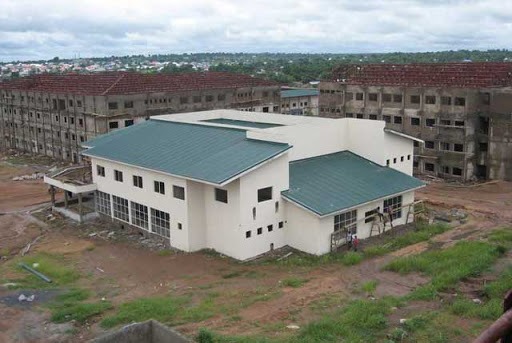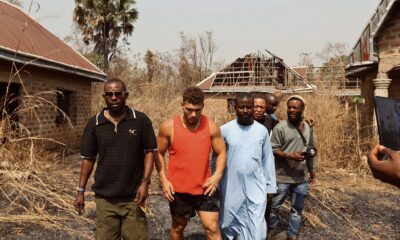Benue news
The professional decay in Benue State Teaching Hospital (BSUTH) is monumental

I ordinarily wouldn’t be reemphasizing my position here but I have clearly seen that there is a relentless efforts of some agents projecting a propaganda documentary of purported achievements of prof. Swende hurriedly put together ostensibly to curry support for his second term considering the fact that his tenure in office elapsed about 3-4 days ago.
One Paul Ikyugun particularly hosted the propaganda article and lots of comments against his “ client” were pouring in. Of over 40 comments, only 2 were soft with words on Swende. The promoter of the propaganda article Paul Ikyugun was visibly all over his wall attacking those who saw no substance in his advertising piece.
I added my humble remarks and people started building on it. Suddenly the propaganda agent, Paul Ikyungun outrightly deleted my comment on his wall. Now, I’m on my wall, in full control to reecho those views I submitted that didn’t sit well with Paul Ikyungun where he got them deleted to avoid the public taking note of, and barring further built up comments therefrom.
The guy was emphasizing infrastructural achievements of prof Swende and I disagreed with vehemence that the primary objective of that hospital was about excellent service delivery and impeccable professional conducts aimed at saving lives. So, if Swende could attract the best of infrastructure transformation only seen in that hospital within this region ( which this too is not possible) but fails to manifest the core values embedded in medical professionalism then he has not served adequately the germane and cardinal purpose for which that hospital was established.
There is a total loss of confidence of the majority of Benue citizens and beyond based on the ugly stories that hospital has accounted for. It is usually avalanche tales of lamentations and regrets for those who have lost their loved ones there. Clearly such decrying accounts are rooted in clear cases of lack of adequate care, ineptitude, quackery, maladroitness and inertial. In the last four years, everyone who has listened to the seamy narratives or has had personal experiences from that hospital would agree that the place has gone into regrettable oblivion and irreconcilable abyss such that one tends to wonder if it is no longer properly funded by the government or the supervising authorities have deliberately neglected it to perish or both.
Now, to propagate infrastructural prowess at the detriment of professional efficacy smacks of misplaced priority from vision-less administrators who are not in tune, clearly, with the purpose for which that hospital was established both in terms of human development and capacity building, service delivery and economic strand.
To many, that hospital has caused more deaths than saved and truly from unbridled negligence. The hospital thrives on its former glory and nomenclature; the services therefrom are not commensurate. The verifiable monumental rots and inglorious status the hospital is basked into today has presented it a nightmare roundly feared! People should go to any hospital with high hopes of recovery from their sickness.
Most times in a hospital, the tender care, guided attention, aptness,appreciable conducts and services avails one a proportional psychological recovery at once! As this is very instrumental, it is clearly lacking at the BSUTH.
Those who have had cause(s) to visit their relatives in that place can attest to the fact that indeed, that hospital is in dare need of a wholistic overhaul both in attitudinal reorientation of the nurses and doctors and professional values rejuvenation.
If the authorities concerned and indeed the Benue state government which is the main financier of that institution needs to revamp that place and restore its battered image, inculcate hopes and assurances into all potential patients, it needs to, and I state with all sense of responsibility, unequivocally, change the management leadership without delay. Prof Swende does not deserve a second term at that place.
His subordinates we hear are not faring well because of some unethical conducts of their leader. He is accused of being very snobbish, arrogant, temperamental, unaccommodating and lone-ranger in policy formulation, evaluations and execution.
He equally does not socialize and never ready to accord commendations to exemplarity and excellence. These decried attitudes of his does not endear many to him and unable to tap the best from those who ought to sustain significant positive marks. The hospital is suffering great losses. At the end of his tenure, he has recruited some propagandists such as Paul Ikyungun to pull some image laundering stunts for his reappointment. But does it stops at that? Where are the gains? Must the hospital go into total extinction?
Can’t we bring capably hands which are abound in the state (and Benue is abundantly blessed with) to also try their hands for a comparison? Is Prof Swende a reservoir of medical excogitations and cannot be excelled by any other medics? No doubts his paid advertisements can subsist; he can pride off with whatever survival stunts both primordial but the truth remains; based on his outings at that place in the last four years, it is provable crystal clear, palpable and verifiable he is not the answer to the myriads of problems that BSUTH is afflicted with and therefore, he has no business returning there for another term except, except, and I dare repeat, except and unless if professionalism, exceptionalism, and excellence is to be murdered at the expense of meritoriousness and accountability.
And this I believe should be the major position of the tax payers citizens of Benue from which source the institution derives it major funding from. Conclusively, this discourse is in the public domain and shall sustain for posterity. In this wake, if anyone is of a contrary view, can pontificate remarkable professional and conventional achievements of prof Swende in the last four years at BSUTH then let’s hear you out with empirical evidences.
By John Akperashi

























